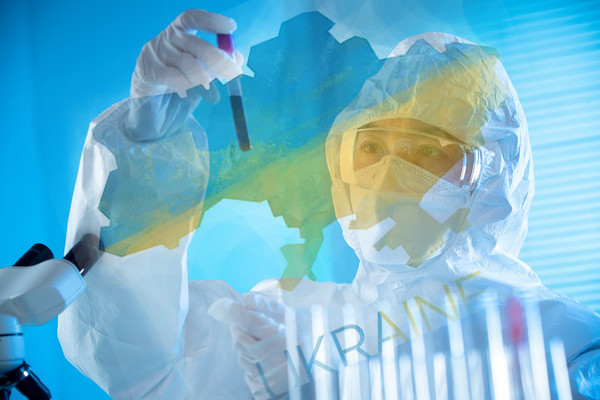The Russian invasion of Ukraine might disrupt ongoing drug trials conducted by Korean biotech companies in Ukraine, industry watchers worried.
However, Korean companies said their clinical trials in Ukraine were part of multinational ones, and the ongoing conflict would rarely affect global studies.

ClinicalTrials.gov, a registry of clinical trials run by the U.S. National Institutes of Health (NIH), showed that three Korean companies – SK Bioscience, Bridge Biotherapeutics, and TiumBio – are testing investigational medicines in Ukraine.
SK Bioscience, working on a Covid-19 vaccine candidate GBP510, conducts phase 3 vaccine trials in six countries – Ukraine, Korea, New Zealand, the Philippines, Thailand, and Vietnam.
SK Bioscience said it completed enrolling 4,037 participants for the vaccine trials in January and that the Russia-Ukraine war would not affect the studies.
“We have already completed the vaccine administration in Ukraine,” an official at SK Bioscience said.
Bridge Biotherapeutics is conducting a multinational phase 2a study of BBT-401, an ulcerative colitis treatment, in Ukraine, the U.S., Korea, New Zealand, and Poland.
The trial is at the final stage, and there will be almost no impact from the war situation in Ukraine, Bridge Biotherapeutics said.
“We have recruited 32 out of 36 target patients for the phase 2a study. We can enroll the rest of the patients in other countries,” an official at Bridge Biotherapeutics said. “As the local situation keeps changing, the company is thoroughly reviewing whether Ukrainian patients could continue to participate in the trial.”
TiumBio is working on a phase 2 study of TU2670, an experimental endometriosis treatment in five countries -- Ukraine, Russia, the Czech Republic, Poland, and Italy.
Patient enrollment in Ukraine is on hold, but the trial in Russia has no issues, the company said.
TiumBio selected those five countries in consultation with IQVIA, a global contract research organization (CRO), to avert the impact of the Covid-19 pandemic. However, the Russian invasion occurred unexpectedly.
Still, the company said the Ukrainian situation’s impact on its clinical trial was not as problematic as expected.
“As we enroll patients in four other countries, except for Ukraine, there is no problem in the clinical trial’s progress,” an official at TiumBio said.
Chong Kun Dang is also conducting a clinical trial in eight countries, including Ukraine, although it did not register the trial on ClinicalTrials.gov.
In September last year, the company said the Ministry of Health of Ukraine approved conducting a phase 3 study of Covid-19 drug candidate Nafabeltan (nafamostat).
As Chong Kun Dang did not assign the number of participating patients by country, the company said there would be no problem conducting the trial.
Another Korean drugmaker Ilyang Pharmaceutical is studying the effect of leukemia drug Supect (radotinib) in a phase 3 study in Korea, Turkey, Russia, and Ukraine. The study is a large-scale confirmatory trial to meet the criteria for conditional approval.
Ilyang started patient enrollment in Ukraine in March last year.
Early this year, it extended the trial completion time from March 2022 to January 2025. Thus, the situation in Ukraine will not have a significant impact on the trial, the company said.

